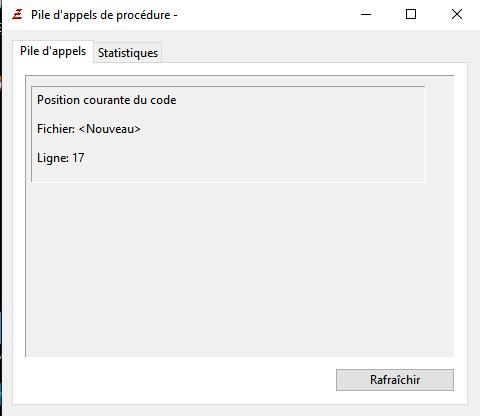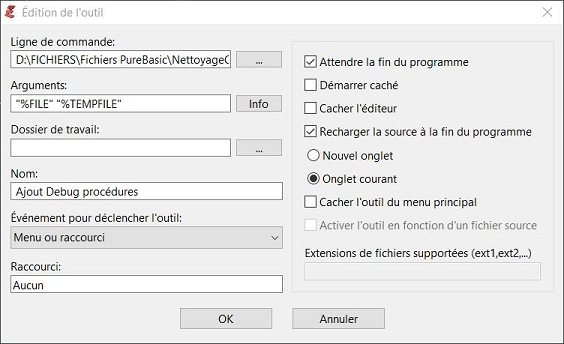Page 1 of 1
Tool for see the call of procedures
Posted: Thu Aug 01, 2024 3:45 pm
by Kwai chang caine
Hello at all
Exist it a tool in PB, who show the list of procedures called and the order where she are called ?
Have a good day
Re: Tool for see the call of procedures
Posted: Thu Aug 01, 2024 4:08 pm
by Axolotl
Have you tried Debugger | Callstack ?
Re: Tool for see the call of procedures
Posted: Thu Aug 01, 2024 8:38 pm
by Kwai chang caine
Hello Axolotl

Yes, i have try the tool CallStacks but not really understand


That only show some lines

Me... i search instead something who write this style of lines :
KCC imaginary CallStack wrote:
Start => one()
One() => Two()
Two() => Tree()
for this code
Code: Select all
Procedure Three()
Debug "Hello"
EndProcedure
Procedure Two()
Three()
EndProcedure
Procedure one()
Two()
EndProcedure
one()
Repeat : Delay(1) :Until GetAsyncKeyState_(#VK_ESCAPE)
Re: Tool for see the call of procedures
Posted: Thu Aug 01, 2024 9:44 pm
by pjay
You could try something like this...
Code: Select all
;/ simple procedure profiling - PJ
#ProcProfile = #True
Global NewMap P_CallCount.i()
Global NewList P_Sequence.s()
Macro ProcProfileBegin
CompilerIf #ProcProfile = #True
P_CallCount(#PB_Compiler_Procedure) + 1
AddElement(P_Sequence()) : P_Sequence() = #PB_Compiler_Procedure
CompilerEndIf
EndMacro
Procedure Three() : ProcProfileBegin
;Debug "Hello"
EndProcedure
Procedure Two() : ProcProfileBegin
Three()
EndProcedure
Procedure One() : ProcProfileBegin
Two()
EndProcedure
One()
OpenConsole()
; output results:
ForEach P_Sequence()
PrintN( "Procedure Call #"+Str(ListIndex(P_Sequence())+1)+": "+P_Sequence()+"()")
Next
PrintN("")
ForEach P_CallCount()
PrintN("Called "+MapKey(P_CallCount())+"() "+P_CallCount()+" time(s).")
Next
PrintN("") : PrintN("Finished")
Input()
Re: Tool for see the call of procedures
Posted: Thu Aug 01, 2024 10:42 pm
by boddhi
Salut KCC,
I usually put after each Procedure X() a:
Code: Select all
Debug #PB_Compiler_Procedure+"(Here, with possibly detail of parameter values)",99 ; 99 to show/hide them with DebugLevel
So, I can see the flow of procedure calls in debugging window.
Re: Tool for see the call of procedures
Posted: Fri Aug 02, 2024 3:36 pm
by Kwai chang caine
Hello at you two

Thanks a lot for your two tips

Apparently we are forced to modify the original code for put the "Flags"

Even if with the IDE "Replace" function that can be more easier, if the code is very big with several includefile, that can be a little bit fastidious

I'm surprising, because i thought FRED had planned this kind of useful tool in his splendid program

Especially since I believe that the precompiler is responsible for tracing the entire path that the program will take before each compilation, if I am not mistaken, which is exactly what I am trying to know.

Again thanks for your answers, i wish you a good day at you two

Re: Tool for see the call of procedures
Posted: Sat Aug 03, 2024 2:58 am
by boddhi
Salut KCC,
If needed, a very old dirty code to add "Debug #PB_Compiler_Debug" in codes.
It is intended for use as a PB-tool IDE and certainly needs to be improved.
Code: Select all
EnableExplicit
Define.s FichierSource,FichierCible,Chaine,ChaineDebug="Debug #PB_Compiler_Procedure"
Define.b Proc
If CountProgramParameters()<>2
End
EndIf
FichierSource=ProgramParameter()
FichierCible=ProgramParameter()
If ReadFile(0,FichierSource,#PB_File_SharedRead)=0
End
EndIf
If CreateFile(1,FichierCible)=0
End
EndIf
While Not Eof(0)
Chaine=ReadString(0)
While Right(Chaine,1)=Chr(32) Or Right(Chaine,1)=Chr(9)
Chaine=Left(Chaine,Len(Chaine)-1)
Wend
If (LCase(Left(Trim(ReplaceString(Chaine,Chr(9),"")),9))="procedure" Or LCase(Left(Trim(ReplaceString(Chaine,Chr(9),"")),12))="proceduredll" Or LCase(Left(Trim(ReplaceString(Chaine,Chr(9),"")),17))="runtime procedure") And LCase(Left(Trim(ReplaceString(Chaine,Chr(9),"")),15))<>"procedurereturn"
Proc=#True
Else
If Proc And LCase(Left(Trim(ReplaceString(Chaine,Chr(9),"")),28))<>LCase(ChaineDebug)
Chaine=Chr(9)+ChaineDebug+"+"+Chr(34)+"()"+Chr(34)+Chr(10)+Chaine
EndIf
Proc=#False
EndIf
WriteStringN(1,Chaine)
Wend
CloseFile(0)
CloseFile(1)
EDIT : As you probably noticed, I wanted to write #PB_Compiler_Procedure instead of #PB_Compiler_Debug.


EDIT 2: Sorry, I forgot to give the tool's config:

Re: Tool for see the call of procedures
Posted: Sat Aug 03, 2024 6:35 am
by AZJIO
Code: Select all
Global order
Macro order(i)
order+1
EndMacro
Procedure Three()
order(i)
Debug Str(order) + " => Three()"
Debug "Hello"
EndProcedure
Procedure Two()
order(i)
Debug Str(order) + " => Two()"
Three()
EndProcedure
Procedure one()
order(i)
Debug Str(order) + " => one()"
Two()
EndProcedure
one()
Repeat : Delay(1) :Until GetAsyncKeyState_(#VK_ESCAPE)
Leave the macro empty when the information is no longer needed
If you need to insert this into someone else's code, then use a regular expression
Find:
Code: Select all
(?mi)^(\h*(?:Procedure[CDL$]{0,5}?(?:\h*\.[abcdfilqsuw])?\h+\K)[A-Za-z_]\w*\h*\(.+)\r?$
Replace:
Re: Tool for see the call of procedures
Posted: Mon Aug 05, 2024 12:45 pm
by Kwai chang caine
Thanks a lot at you two, i take a look to your tips


